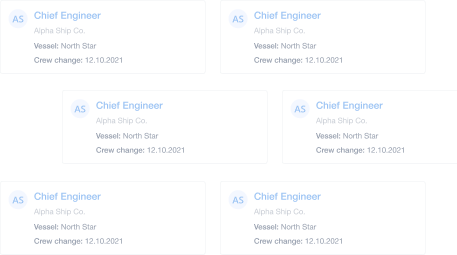Working at sea in a seafarer's job comes with many pluses. The travel, the sense of freedom, the opportunity to see Mother Nature at her wildest and most awe-inspiring, and the strong bonds and friendships that are created while working in jobs at sea.
But, as with any job, whether you’re on land or in the middle of the ocean, there can be the odd downside. And one of those, as some seafarers will tell you, is homesickness.
Of course, living and working away from home is a big part of working in maritime jobs. Indeed, it is in many jobs where travel or working abroad, or in a different part of the country is a reality.
Many people working in logistics and maritime transportation know this, as do others from charity and aid workers to the military, and even actors and pop stars. (Although we could argue that they have a very different lifestyle!)
Whether your vessel's trading area is local to your home country or you’re crewing in a far flung destination such as the Caribbean, the end result is the same: you’re away from your family, loved ones and friends.
Read more: Jobs at Sea and Practical tips for a Healthy Relationship
And if you get bouts of homesickness, whether it’s for your first few days at sea, somewhere in the middle of your contract, or right at the end when you just can’t wait to disembark and get home, knowing how to deal with it can bring real relief.

5 tips for dealing with homesickness when you work at sea in a seafarer's job
So what actually is homesickness? The dictionary defines it as being “...sad or depressed from a longing for home or family while away from them for a long time.”
And feeling homesick can happen to any of us at any time.
Whether it’s a student who is studying in a foreign country, to someone working in a different city and only commuting home at the weekends, to expats on contracts working and living on a different continent, to of course, the men and women who keep our industry afloat: seafarers.
Maybe you’ve been working in jobs at sea for years, or perhaps you’re a deck cadet fresh out of maritime academy. It doesn’t matter. If you’re homesick, you’re homesick. So here are some tips to help you feel a little better before you return to shore.
1. Make an effort to get to know your crewmates
Maybe you’re lucky enough to already get on well with some of the other seafarers that you often find yourself crewing alongside. Maybe you don’t know a soul onboard. (Though that will soon change.) Perhaps you’re even working with someone you don’t particularly like.
Either way, jobs at sea are just like any other job in the world: they’re always more enjoyable when you get along with the people you work with. If that comes naturally, that’s great. But what if you don’t know (or like...) other members of your vessel’s crew?
This is where making an effort, upping your communication game, and creating a community at sea comes in.
If you don’t know the other seafarers who are contracted for maritime jobs on your ship, trying to get to know them will make a big difference when it comes to beating homesickness.

You never know - that one person you didn’t like the look of when you embarked, might just turn out to become a lifelong friend once you get to know them.
And even if there are other seamen on board who you’re never going to be friends with, bear in mind that by being the better man or woman and rising above any issues will make you more popular with the other crew, and quite likely your superiors - and the shipping company or maritime recruitment agencies you work for.
Read more: How to Cope with Bad News When You're Working at Sea
Building a friendship or support group around you when you’re working in seafarer jobs might not replace your real family, but it will help you establish a second family away from home.
Which brings us on to...
2. Stay in touch with family as much as possible
While not every vessel will have an internet connection, if you are lucky enough to be able to get online, stay in touch with your family and loved ones on shore as much as possible.
Just hearing the voice of your partner or spouse, of your parents or children, will remind you of home and go a long way to making you feel better.
Read more: Two-Way Communication Tips for Seafarers and Their Families
It’s also important that you stay in touch with your partner to maintain those bonds while you’re away working in maritime jobs.
Relationships can feel the strain when one partner is working in jobs at sea and it will make both you and your ‘significant other’ feel good to hear one another’s voice.

3. Keep busy between shifts or watches
Okay, hear us out here. We know that the main thing you might want to do when you’ve finished your shift or watch is to SLEEP.
Seafarer jobs are demanding, we know that.
But having the willpower to go to the gym or do some exercises on deck will lead to a healthy body and a healthy mind. And you’ll have no time to feel homesick when you’re counting reps or spotting a fellow crewmate while they bench press!
Related: 10 Ways to Chill During Your Downtime in Seafarer Jobs
If your body is too dog tired to hit the gym, why not think about doing a little brain training instead? Many institutes of education offer distance learning courses, so you could use your free time to brush up on your math skills, learn how to code or gain additional seafarer qualifications to further your career.
If formal training is too expensive or time consuming, or too much of an investment, why not team up with a crew member who speaks a different language to you and take part in a language exchange?
That will also tie in with tip number one as you enjoy some bonding time AND learn a new skill - while also taking your mind off your feelings of being homesick.
4. Take comfort in your onboard routine
The results of a study conducted by the University of Alabama's School of Public Health appeared to show that someone who is homesick is of course missing their home and family, but also their routine. Having a routine is something that makes life feel ‘normal’.

Therefore, to distract yourself from your homesick feelings while you’re working in seafarer jobs, try and remember why you are away at sea, and take comfort from the routine and structured lifestyle that jobs at sea offer. And that brings us on to...
5. Learn to really love your job
Working in maritime jobs is something to be truly proud of. You’re, quite literally, keeping the world of trade and commerce turning!
But sometimes it can be easy to lose sight of why we’re in the career that we’ve chosen and if your homesickness is making you wonder why you chose to work in jobs at sea, it could be time to remind yourself why you’re onboard and fall back in love with your trade.
Ways to start feeling positive about your seafarer jobs include things like going above and beyond the call of duty to help others. That will give you a sense of satisfaction - and make you popular onboard ship!
It’s a well known fact that giving compliments makes the giver feel just as good as the receiver. So why not try handing out some praise for a job well done to a younger or less experienced seafarer.
If you are the younger or less experienced seafarer take enjoyment from learning how the seaman working in the rank above you works. Learning makes us more positive and it won’t do your career in maritime jobs any harm either.

Martide helps you find seafarer jobs
If you’re looking for your next contract or maritime job, Martide can help. We’re always looking for qualified seafarers to join us and help to fill the jobs at sea that we advertise for our well known clients in the shipping industry.
If you’re looking for OOW jobs, chief engineer vacancies, ordinary seaman jobs, junior electrician jobs or any other seafarer rank, create a profile now and then take a look at our open seafarer jobs and start applying today.

Eve Church
Eve is Martide's content writer, publishing regular posts on everything from our maritime recruitment and crew planning software to life at sea. Eve has been writing professionally for more than two decades, crafting everything from SEO-focused blog posts and website landing pages to magazine articles and corporate whitepapers.
UK

is the only site for maritime jobs




